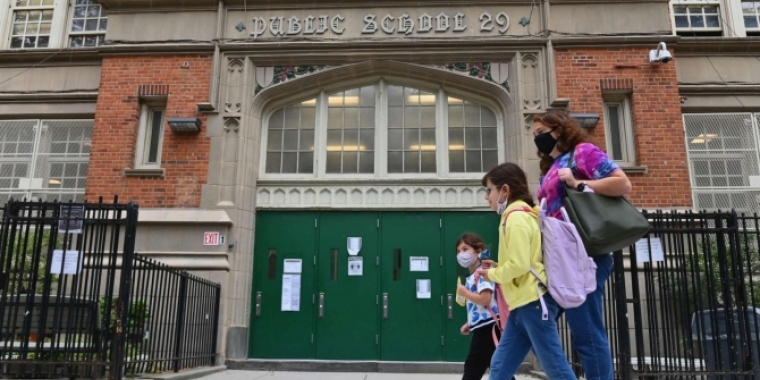
Gay Marriage Bill Nears the Goal Line
Gov. Cuomo’s push, plus public opinion shift, raises bill’s chance of passage
By Megan Finnegan
Two years after the stunning defeat of a marriage equality bill in the State Senate, advocates and politicians are gearing up for another run at making same-sex marriage legal in New York.
With popularity high and momentum strong after passing an on-time budget, Governor Cuomo has made it a priority to introduce and push for the passage of new legislation to allow same-sex marriage. A recent poll from Sienna College shows that 58 percent of registered voters support the measure, with only 36 percent in opposition, and proponents are seizing on those numbers to persuade the public as well as elected officials on the fence that now is the right time to give gay marriage a legal stamp of approval.
Many expected the bill to pass the Senate in 2009, when Senator Tom Duane led the charge and assured fellow Democrats that a handful of Republicans had secretly agreed to vote yes; when it came to the floor, however, every Senate Republican voted no. Since then, supporters have been refining their approach and strategizing for the upcoming public push.
“There is amazingly strong support for the freedom to marry in New York,” said Marc Solomon, the national campaign director for advocacy group Freedom to Marry. His organization has joined forces with the Empire State Pride Agenda, Marriage Equality New York, Human Rights Campaign and Log Cabin Republicans to form the coalition New Yorkers United for Marriage Equality. Solomon said there are several differences this time that he believes will sway the vote in their favor, the first one being a united front.
“We have a governor who has really put his muscle behind moving this legislation,” Solomon said. “We collectively, we advocates, have been mobilizing and organizing couples to share their stories with their lawmakers.”
“Our families are more visible in the media, letting people see who we are,” said Cathy Marino-Thomas, board president of Marriage Equality New York. “We’re trying to bring the human face out to the public so they can see we’re not green, we don’t have three heads. We’re looking to normalize, basically.”
The state Assembly has passed a bill legalizing same-sex marriage three times in the past; it was the third legislative body in the country to do so without being ordered to by its governor. Assembly Member Daniel O’Donnell, who represents the Upper West Side, has sponsored the bill each time and plans to do so again once the governor introduces it. For O’Donnell, who is waiting for the passage of the law to marry his long-time partner, the issue goes beyond personal emotion and is a matter of equality under the law.
“It involves the question of whether or not the state of New York should continue to discriminate against people by denying them a license,” said O’Donnell. At every marriage ceremony, regardless of who’s performing it, the officiant says, “By the power vested in me by the state of New York,” he noted. “There are rules about it, you have to be a certain age, you can only get one at a time. People like me are currently deprived of the opportunity to get that license. The question is, should that be the way it is?”
While the Assembly is expected to pass the measure a fourth time when it comes up, O’Donnell’s not resting easy. Speaker Sheldon Silver has said that he won’t bring the Assembly bill to the floor again until it passes the Senate first.
Supporters in the Senate are focusing their attention on the handful of Republicans who may change their vote to “yes” this time around. Currently only 26 Senators are confirmed “yes” votes; six more are needed to pass a bill.
“At minimum, we need three Republicans, and I think we could use as many as six,” said Senator Liz Krueger, noting that they can’t necessarily count every Democrat as a yes. “I don’t believe that civil rights should be defined as a partisan issue.”
Krueger recalls that when she began advocating for same-sex marriage in 2002, many opponents were surprised even to find out that gay couples were having children and forming families that look very much like traditional nuclear families. Now, she said, even opponents of same-sex marriage are much more aware of what’s actually at stake.
“You have a bunch of people who will say, ‘I can accept a civil partnership, I can’t accept marriage.’ Whenever someone says that to me, I think, ‘OK, there’s an opening,’” said Krueger. She is also quick to assure opponents that the law would have no affect on religious institutions; a state law recognizing same-sex marriage would not require any religious body to accord the same recognition.
“There’s a myriad of reasons why the community needs marriage and not any other form of recognition,” like civil unions, said Marino-Thomas from Marriage Equality.
“There are over 1,300 state-level rights that come exclusively with marriage. Some are obscure, but some are things that families use daily, like inheritance,” Marino-Thomas said. “Civil unions are not portable. You leave your state, you have nothing; a marriage is a marriage and you can take it everywhere. If I say, ‘This is my wife,’ people understand who that is. There’s no reason to create a secondary status.”
Senator Adriano Espaillat, whose Upper West Side and Harlem district encompasses both liberal enclaves and more conservative, Catholic constituents in immigrant communities, has been a vocal supporter of same-sex marriage since his time in the Assembly. He said that while public support is important, it’s not the most important factor.
“We shouldn’t just depend on opinion polls. Very often the right thing has not always just been the most popular thing. If we were tied at the hip to a poll, we never would have passed civil rights or women’s rights laws,” said Espaillat. “Justice delayed is justice denied. This is a civil rights issue as well, for me. I’m an immigrant, so I know what discrimination is, and this is no different.”
Some opponents of same-sex marriage say that now is not the time to focus the state’s energy on passing this legislation; supporters say that it’s an urgent matter for those currently denied their rights.
“My friend Edie is 84 years old. She lost her partner of 44 years; her tax bill was over $300,000. For Edie, it’s the right time,” said Marino-Thomas, referring to Edie Windsor, who has filed suit with the ACLU against the federal government and the Defense of Marriage Act for failing to recognize her marriage. Advocates are hoping stories like Edie’s will help legislators understand how the current laws affect their constituents.
Still, the vote, when it comes up, is far from a sure thing. “It’s not a done deal, by any means,” said Richard Socarides, president of Equality Matters, a national advocacy group. “It will be very difficult still, and all the talent and the money in the world may not be enough to get us the five or six votes we need to get this through the Legislature.”
While they wait for the governor to hand down a bill, advocates are focusing on ways to get their message across in clear, consistent ways.
“The love is already there and the commitment is already there, so the things that our opponents are afraid of, we’re already doing,” said Marino-Thomas. “We’re already living in family structures, but the problem is that those families are not legally protected.”
With additional reporting by Laura Nahmias, The Capitol.



